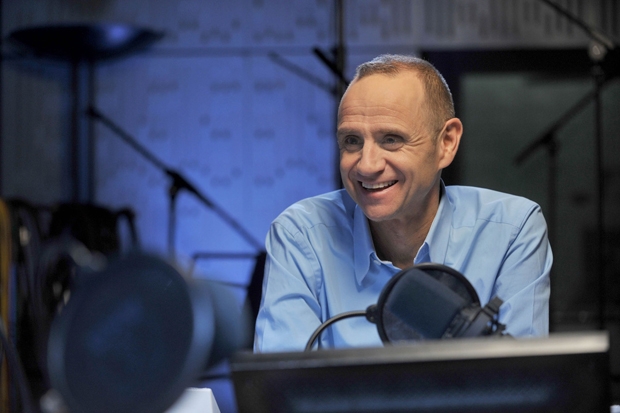It’s unusual for somebody promoting his own television programme to tell you not to watch it, but that’s what Evan Davis has been doing. At least, he has asked us not to watch Newsnight during his first week as its chief presenter — the week that is now drawing to its close — because it probably wouldn’t be any good until he’d had a bit more experience. And even then it might turn out to be no good, he’s said: we probably would know by Christmas if it was a disaster. As it happens, I am writing this just before his first appearance on the late-night news programme, but I wonder whether he will have cried on air. In interviews, he has talked a lot about his crying. ‘I cry a lot. All the time,’ he told the Times. And the particular thing that made him cry most often was ‘people trying to maintain dignity in the face of adversity’.
Such people are exemplified by many of the politicians he will be required to interview, so tears might easily flow. The idea of an interviewer crying is a novel one: if anyone were to cry, one would expect it to be the interviewee (as the late Gilbert Harding did in 1960 during his famous Face to Face interview with John Freeman). But Davis is not ashamed of being a sensitive sort of chap. As an openly gay man, with a tattoo and rumours of hidden body piercings, he seems rather proud of not being an ‘Alpha Male’. ‘I am SO not Jeremy Paxman,’ he told the Daily Telegraph, with evident satisfaction.
For he is eager to make clear, in the politest possible way, that the adversarial approach to interviews, for which Paxman and John Humphrys are celebrated, is not in his view the only — or, indeed, the best — one. ‘My own feeling is that the idea that every interview is about trying to expose the fault in the argument being presented is a mistaken premise,’ he said. ‘I think the danger is that journalists have become so full of themselves …that they’ve forgotten that there are a million other ways of having a useful conversation with people.’ Politicians, he believes, are now ‘overscrutinised’: ‘It’s possible that we are holding our politicians to account to such a degree that we’re almost paralysing them. They can’t think aloud. They can’t even eat a bacon sandwich in a natural way.’
Much as I will miss the spectacle of Paxman crushing his victims, so many of whom deserved to be crushed, I think that Davis is right: the time is ripe for a new approach to the political interview. Politicians have seldom been held in lower esteem, and the aggressive interview makes them so cautious, defensive and repetitive that their reputations can only suffer more. Now you have to be an outspoken, maverick populist, like Nigel Farage, to command any degree of public enthusiasm. This is very bad for democracy. Assuming, as one must, that not all politicians are craven and corrupt, it would be good to give a chance to those who are not to reveal themselves, to encourage them to speak freely and uninhibitedly without fear of being pulverised.
Politicians, however honourable and well intentioned they may be, have all been cowed by the deluge of public opprobrium brought on them by the expenses scandal. Although they are underpaid, they do not dare to accept a pay rise; and they hardly even dare to charge justified expenses for fear of unjustified outrage. Those that deserve it should now be allowed to present themselves as the decent people they are, if any respect for the political class is to be restored. And this would appear to be Davis’s intention, if he doesn’t quite put it that way. His aim is to be curious rather than aggressive and to give more modest people a chance to speak up. ‘I don’t want alpha males making all the decisions,’ he has said. ‘I would like more thoughtful people to have more of a say over things.’
This is an ambition that he will find difficult to fulfil, but he has set a good example as an interviewee himself. He has answered all questions, even those about his private life and sexuality, with disarming frankness and with a degree of self-deprecation that has not seemed false. My hopes are rather high.






Comments